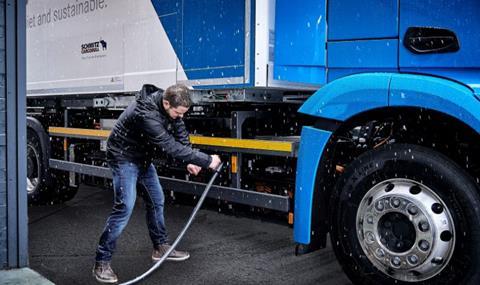
The government must provide reassurance that cleaner lorries running on alternative fuels will last for at least 12 years if the industry is to decarbonise within the next 20 years, according to the RHA.
Following an announcement this week that the UK has pulled forwards its ban on petrol and diesel cars and vans to 2035, business groups have warned that any shift to electric or alternatively fuelled vans and lorries will require a huge investment in overhauling the nation’s power supply.
The RHA said changing the UK’s car fleet to electric was possible because “they are increasingly available, with improving range and infrastructure that will work for users".
However, RHA chief executive Richard Burnett added: “For vans this is less clear cut because payloads and duty cycles are much more demanding.
“The changeover process for heavy goods vehicles is different again. Research into alternative fuels is already widespread.
“However, because of the nature of the road freight industry and the distances covered, there is still a very long way to go before an efficient, cost-effective alternative to diesel-powered trucks can be found.”
Read more
- Biofuels are quicker route to decarbonising road transport than battery electric
- Hydrogen will play a key role in decarbonising road transport
- Transport industry failing on its green responsibilities, new report claims
Pointing out that the average price of a truck is around £85,000, Burnett added it would be years before an alternative-fuelled lorry became available that ticked all the boxes for hauliers: “Vehicles are an expensive investment,” he said.
“If companies are to invest in cleaner vehicles the government also needs to reassure buyers that they will be able to use them for a reasonable lifespan – at least 12 years for lorries.”
The FTA said that until the issue of power supply was resolved, it was unlikely that 100% of new vans bought after 2035 would be electrically powered: “The 2035 target is very ambitious for the van market,” said Christopher Snelling, FTA head of UK policy.
“Unless the government takes urgent action to solve the challenges around power supply and the availability of electric vehicles, it will not be an achievable feat.”
UK electricity regulator Ofgem said this week it would publish an electric vehicle strategy explaining how it expected to support a roll-out and how the grid needed to evolve to meet increasing demand.
The Committee on Climate Change estimates that to facilitate a changeover to just electric vans and cars, there will need to be 3,500 rapid and ultra-rapid chargers near motorways and 210,000 public charges in towns and cities, up from the 30,000 public chargers of all speeds currently installed.














